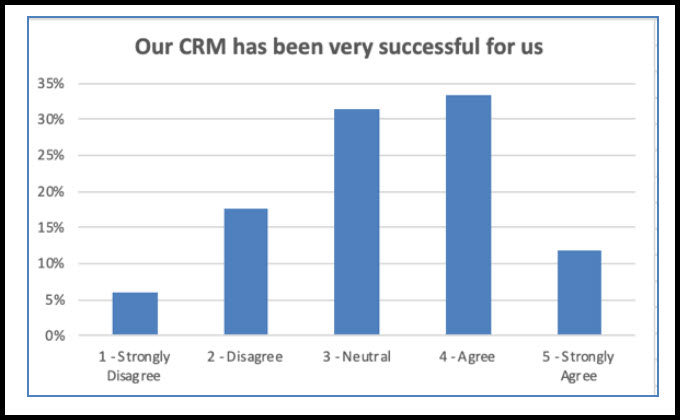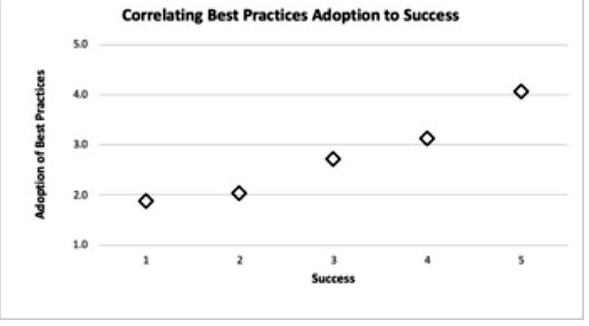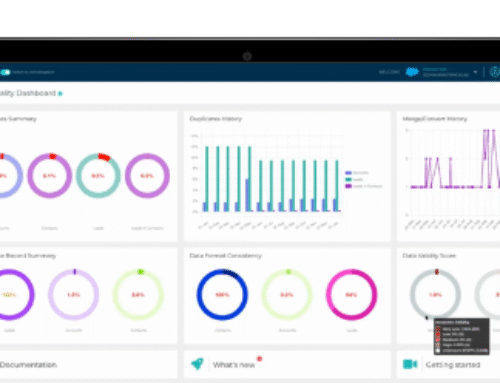Wow. More Than a 50% Failure Rate
So we ran a little survey. Polled about 1,000 executives and sales users on their perceived CRM success. And less than 50% considered their CRM a win.

So We Asked Some More Questions. And It Got Really Interesting.
While we were at it, we also surveyed the group on their adoption of CRM best practices. Wow. It turns out there’s a very strong correlation between whether those frustrated with their platform were adhering to those best practices.
The reality? It’s not whether a CRM will work for you; it’s whether you know how to make it work for you.
Grouping the Key Questions
- Adoption. Adoption means your user set has embraced the CRM as an embedded tool. Users adopt a system that is an indispensable productivity tool for users, that management can’t function without, and that management mandates use of.
- Organizational Commitment. You’ve almost certainly heard the adage, “if it isn’t in the CRM, it doesn’t exist!” Cliché by now? Yeah. Well, it’s true. Successful embrace of a CRM does not happen by osmosis. It happens because the management team is determined that a CRM is a mission-critical system. They’ve ensured that all users are trained and aligned. And they’ve recognized that a CRM isn’t just a new tool, it’s a paradigm shift. And put in place appropriate change management processes.
- Process-centric & productivity-focused approach. CRMs are a sales and marketing process automation tool. When key elements of the company’s core movements are left out of the platform, users are forced to execute them somewhere else – another database, Excel, a little black book, their head …. Data gets scattered, functionality is missed, labor increases, the value of the CRM is not exploited. And if executives simply take the approach of using the CRM as a measurement tool, and don’t ensure that it returns value to the users, productivity opportunities aren’t realized.
- Measurement and Insights. We are routinely amazed by how enthusiastically managers respond to a well-crafted dashboard in CRM. Which speaks to the paucity of good, actionable information they have to manage their businesses. And how individual reps use data to self-manage. Additionally, the CRM should surface actionable insights, signals guide you to where to focus your efforts.
Adoption
1. The team, in general, WANTS to use the CRM; they find it invaluable
2. Sales reps are in and out of the CRM all day long; they’ll grind to a halt if it breaks
3. Managers are highly reliant on the CRM to run their business; they’re in trouble if it breaks
Organizational Commitment
4. Top management mandates use of the CRM; no exceptions are permitted
5. Use of the CRM is uniform and consistent across our team
6. We invest in training and support for the CRM; users understand it well and can easily get help if needed
7. The CRM is expected to provide continuity of business – if someone were to get hit by a bus, their backfill could easily pick up where they left off.
Process-centric & productivity-focused approach.
8. Our key sales and marketing processes are all embedded in the CRM
9. Our CRM ensures we target the right companies, and provides visibility to how effectively we’re engaging with them
10. The CRM is used extensively to track calls, log key meetings, and keep track of relevant conversations
11. Key transactions that will grow our business (new sales, new customers, new partners) move through the CRM in a logical & disciplined flow
12. Manual tasks have all been automated within the CRM; it makes our team more productive and efficient
13. We can plan our business from within the CRM; we can see how we perform to plan within the CRM
14. The CRM is seamlessly linked to other key technologies, such as email & calendar, website, our ERP system, etc.
The data in the system is clean, complete, and reliable
To request the full survey, Click here And if you’d like a free assessment of where YOU stand on this spectrum, Click Here.







